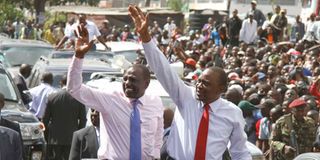How Uhuru, Ruto ICC verdict has saved graft, hate speech suspects

President Uhuru Kenyatta and his deputy William Ruto acknowledges their supporters along Outering road in Nairobi on October 9, 2014 after the president jetted back from Hague, Netherlands where he attended the ICC status conference.
Persons facing integrity questions will not be blocked from vying for elective seats in the August 9 General Election, the electoral commission has said.
The Independent Electoral and Boundaries Commission (IEBC) has instead blamed courts for hindering its mandate to enforce ethics and the code of conduct in the elections process.
The IEBC says its decision to allow ‘tainted aspirants’ is based on past judgments by courts.
Among the rulings that the IEBC has cited is one in 2013, when the High Court that cleared President Uhuru Kenyatta and his deputy William Ruto to vie for the presidency.
At the time, Mr Kenyatta and Dr Ruto were facing charges related to crimes against humanity at the International Criminal Court (ICC).
A civil society group, the International Centre for Policy and Conflict, wanted President Kenyatta and Dr Ruto barred from vying on the grounds that they were tainted.
But a five-judge bench ruled that it was unreasonable to limit their rights under those circumstances.
In its response to a petition by activist Okiya Omtatah seeking to bar aspirants with a tainted past from contesting in the August 9 polls, IEBC says it cannot disqualify an aspirant on the basis of a pending criminal case.
“IEBC is aware of the judgment (in the Uhuru and Ruto case) where a five-judge bench of this court seized of a question bordering on eligibility to vie for elections by individuals facing criminal charges,” says the IEBC in the submissions.
“From this court’s rendition in that case, application of presumption of innocence in considering whether to nominate a candidate to vie for elections or not is not a myth as alleged by the petitioner but a Constitutional imperative.”
Morality and ethics
Through its legal and public affairs director, Chrispine Owiye, the IEBC adds that integrity, morality and ethics have not been conclusively defined.
Regarding integrity, the court is guided by another judgment delivered in 2012 where the High Court explained that integrity, as conceived under Chapter Six of the Constitution, demands inquiry as to substantial unresolved questions about one’s integrity and that inquiry must not be elevated to the threshold of criminality.
The lawyer states that though IEBC is required to conduct an inquiry on a candidate’s integrity, it is encumbered by lack of its own investigative machinery.
He says it largely relies on information provided by other institutions such as the Ethics and Anti-Corruption Commission.
However, the reports submitted by EACC are not conclusive in determining the fate of a candidate to vie unless backed by an order from a court or a quasi-judicial body.

Deputy President William Ruto, President Uhuru Kenyatta and First Lady Margaret Kenyatta at Afraha Stadium in Nakuru during ICC Prayers rally on April 16, 2016.
He cites another judgment in a case involving Taita Taveta Governor Granton Samboja’s academic credentials, where the court said it is the mandate of the EACC to furnish the IEBC with records concerning issues of integrity, morality and ethics on the candidates.
“[Such] records are not conclusive in determining the fate of a candidate to vie unless backed by an order of a court or quasi-judicial body,” Mr Owiye says.
Cognisant
The IEBC also says it is cognisant of the fact that moral and ethical standards are undefined with certainty and do not meet the muster of Article 24 of the Constitution on the limitation of rights provided under Article 38 Constitution.
The IEBC has also blamed a recent judgment in a case involving Murang’a Women Representative Sabina Chege, where the court said the agency’s Electoral Code of Conduct Enforcement Committee does not have the powers to issue summons.
In that judgment, the court also declared that the committee is an unconstitutional entity. The IEBC says the judgment sounded the death knell for its desire to enforce the electoral code of conduct.
“Drawing from the success in the implementation of code of conduct in other countries, IEBC developed [the] Electoral Code of Conduct in 2012. Whereas the enforcement of the code is the mandate of the IEBC, this court sounded a death knell on the Commission’s attempts to enforce the same,” Mr Owiye says.
He adds: “With the judgments of this court, the IEBC is encumbered in its mandate not only during the nomination of the candidates but also after nominations.”





